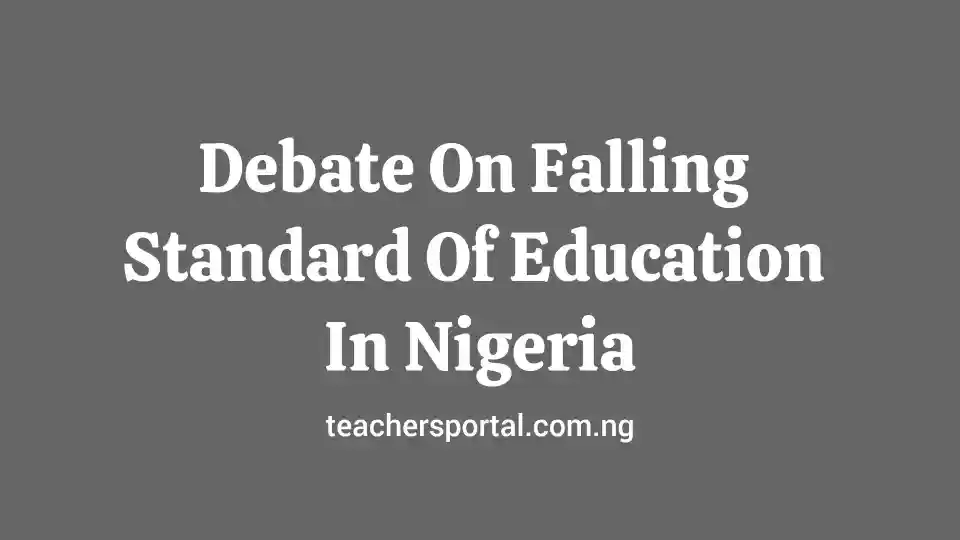Education is an intrinsic right that every child must obtain in any respectable society. It plays a vital role in the development of individuals and societies alike. In our society, education is of immense value, as it serves as the means of transmitting culture, norms, traditions, values, and ethics from one generation to the next. Acting as a catalyst for modern successes and a productive future, education eradicates the afflictions of ignorance and superstition. Fafunwa, in 1974, eloquently defined education as the amalgamation of all processes through which a child or young adult develops abilities, attitudes, and other positive behavioral traits that contribute to the well-being of their society.
However, highlighting the alarming situation of education in Nigeria, Teachers without Borders (2006) reported that the standard of education can be measured by the outcomes produced by schools. It assesses how school leavers contribute to society in terms of cognitive, affective, and psychomotor skills, knowledge, and the right attitude. Unfortunately, when the standard is low, it results in the production of inadequately equipped graduates.
These graduates enter the job market lacking the necessary knowledge and skills, often accompanied by questionable attitudes. The criterion to judge an individual’s education lies in measuring the standard of their education. While some argue that education’s global perspective does not indicate a falling standard, proponents of this view emphasize three domains of education – cognitive, psychomotor, and affective. However, if the cognitive domain has indeed declined, the other domains’ proficiency might also be affected.
Although some might argue that excelling in psychomotor or affective domains could compensate for cognitive shortcomings, the declining cognitive aspect of Nigeria’s education is a matter of concern. The speed at which students learned centuries ago cannot be compared to the present, revealing a need for improvement.
Presently, Nigeria’s education system produces graduates who may carry the title of “literate,” but they are often inadequately trained, failing to meet the required standard. This problem does not solely originate from higher education institutions but begins at the primary level, which serves as the foundation of learning.
However, here are reasons why each stakeholder should be blamed for the falling standard of education in Nigeria:
Pupils/Students: Many students lack discipline and dedication to their studies, leading to a decline in the standard of education. Instead of focusing on their academics, they prioritize distractions like games, television, and peer influences. Their apathetic attitude towards learning hinders their overall academic performance and prevents them from acquiring the necessary knowledge and skills for a productive future. Without a strong commitment to their education, students fail to reach their full potential and contribute meaningfully to society.
Parents: Parents play a crucial role in their children’s education, and they cannot be absolved of responsibility for the falling standard of education in Nigeria. Some parents prioritize their means of livelihood over their children’s education, neglecting to provide necessary school materials and even engaging their children in hawking during school hours. This lack of support and interest from parents directly affects the motivation and commitment of the students to excel in their studies. Without proper guidance and encouragement from parents, students may lose interest in learning, leading to a decline in academic performance.
Teachers: Teachers are pivotal in shaping young minds and fostering a conducive learning environment. However, some teachers fail to discharge their duties diligently, engaging in other businesses or even politics during school hours. Such actions compromise the quality of education and disrupt the learning process. Inadequate teaching and a lack of passion for their profession result in students not receiving the proper knowledge and guidance they need to succeed academically. The failure of some teachers to provide quality education contributes significantly to the declining standard of education in Nigeria.
Government: The government also bears a significant responsibility for the falling standard of education. While they may profess free education, the lack of investment in schools, inadequate facilities, and mismanagement of funds hamper effective learning. Insufficient resources lead to poorly equipped classrooms and limited access to quality education. Corruption within the education system and society at large further compounds the problem, eroding public trust in educational institutions and hindering efforts to improve the education system.
Society: Society as a whole shares the blame for perpetuating the falling standard of education in Nigeria. The societal pressure for paper qualifications and the emphasis on certificates rather than practical skills divert students from acquiring relevant knowledge and competencies. This leads some individuals to pursue degrees from unaccredited institutions, which devalues the overall quality of education in the country. Additionally, the lack of emphasis on skill development and practical learning hinders students from acquiring the necessary competencies to thrive in a rapidly changing world.
In conclusion, the falling standard of education in Nigeria can be attributed to the collective failure of pupils/students, parents, teachers, the government, and society. Each stakeholder must take responsibility for their part in the decline and work collaboratively to address these challenges and uplift the education system. Without concerted efforts from all parties involved, future generations will continue to suffer from the consequences of a weakened education system.
